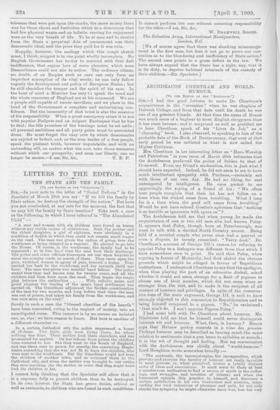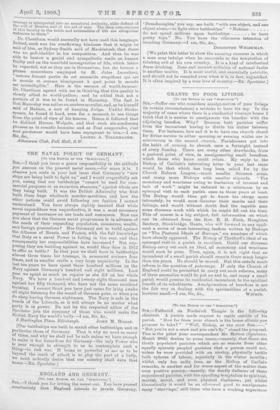ARCHDEACON CHEETHAM AND WORLD- HUMOUR.
[To THE EDITOR or .rns "SPECTATOR."] Sm,—I had the good fortune to make Dr. Cheethem's acquaintance in the " seventies " when he was chaplain of Dulwich College, and from that date until his death he was one Of my greatest friends. At that time the name of Ronan was much more of a bugbear to most English clergymen than it has since become ; and it surprised as well as gratified me to bear Cheetham speak of his "Livre de Job" as a "charming" book. I also observed, in speaking to hitn of the probable date of the Book of Deuteronomy, thet even at that early period be was initiated in what is now called the Higher Criticism.
Mrs. Cheetham in her interesting letter on " Hero-Worship and Patriotism" in your issue of March 20th intimates that the Archdeacon preferred the policy of Selden to that of Cromwell. From my friend's moderation, this is just what I should have expected. Indeed, he did not seem to me to have much intellectual sympathy with Puritans,—certainly not with those of our own day. He had no liking for zeal untempered by intelligence. He once quoted to me approvingly the saying of a friend of his : "We often hear people complain that their lot has not fallen on is time when the wicked cease front troubling. What I long for is a time when the good will cease front troubling." Would be not have echoed Goethe's aphorism that "nothing is so terrible as ignorance with spurs on" P The Archdeacon told me that when young he made the acquaintance of one or two old men who had known Paley. It appears that Paley, though born at Peterborough, was wont to talk with a decided North Country accent. Being told of a ,married couple who never once had a quarrel or even a dispute, he tersely remarked: " Varry dool." Dr. Cheetham's account of George III.'s reason for refusing to appoint Paley to a bishopric was different from that which I have somewhere seen in print. He said that Paley, when arguing in favour of Monarchy, had first stated the obvious grounds which might be alleged in favour of Republican institutions. I understood Cheetham to say that the apolOgist, when thus playing the part of an advocatus diaboli, asked whether it would not scent strange for a flock of pigeons to choose one a their number, which did not seem wiser or stronger than the rest, and to make it the recipient of all manner of honours and privileges. In spite of the conserva- tive tone of the main argument, George III. is said to have strongly objected to this concession to Republicanism and to being himself compared to a pigeon, "No," he exclaimed ; "that won't do. I can't appoint Pigeon-Paley."
I had some talk with Dr. Cheetham about humour. Mr. Gladstone told me that he himself could never distinguish between wit and humour. What, then, is humour ? Renan says that Hebrew poetry consists in a rime des pensoes. Perhaps humour may be described as bearing much the same relation to sentiments that a pun bears to syllables or sounds ; it is the wit of thought and feeling. But my conversation with the Archdeacon was chiefly about " world-humour." Lord Houghton wrote somewhat broadly :—
"The contrasts, the inconsistencies, the incongruities, which provoke and exorcise the faculty of humour are really invisible to most persons, or, when perceived, arouse a totally distinct order of ideas and associations. It must seem to them at best a mischievous inclination to find a source of mirth in the suffer- ings, and struggles, and troubles of others; and when the humourist extends this practice to himself, and discovers a certain satisfaction in his own weaknesses and miseries, intro- verting the very sensations of pleasure and pain, be not only checks the sympathy he might otherwise have won, but his very
courage is interpreted into an unnatural, audacity, alike defiant of the will of Heaven and of the aid of man. The deep consolations of this faculty in the trials and extremities of life are altogether Unknown to them."
Dr. Cheetham would assuredly not have used this language. Indeed, such was his overflowing kindness that it might be said of him, as Sydney Smith said of Mackintosh, that there Was no gall-bladder in his composition. And thus be was able to bestow a genial and sympathetic smile on human frailty and on the manifold incongruities of life, which latter he regarded, not as they are in themselves, but (to borrow a phrase somewhere employed by M. Jules LomaStye), " comme faisant partio de cet ensemble stupefiant qui est le monde et comma tOmoignant quel point le monde est inintelligible." Here is the essence of world-humour. Dr. Cheetham agreed with me in thinking that this quality is Closely allied to world-pathos; and he added that not it Particle of it was to be found in Macaulay, The fact is that Macaulay was rather an austere moralist, and, as he himself said of Hallam, a sort of hanging Judge. Unlike Shake- speare, he found it hard, even for a moment, to see things from the point of view of his knaves., Hence it followed that he disliked Horace Walpole, and that such sin-condoning Phrases as /a comedie humaine and as Tout comprendre, c' est tout parclonner would have been repugnant to him.—I urn, LIONEL A. TOLLEMACHE.
Ilthenwum Club, Pall Mall, S.W.











































 Previous page
Previous page